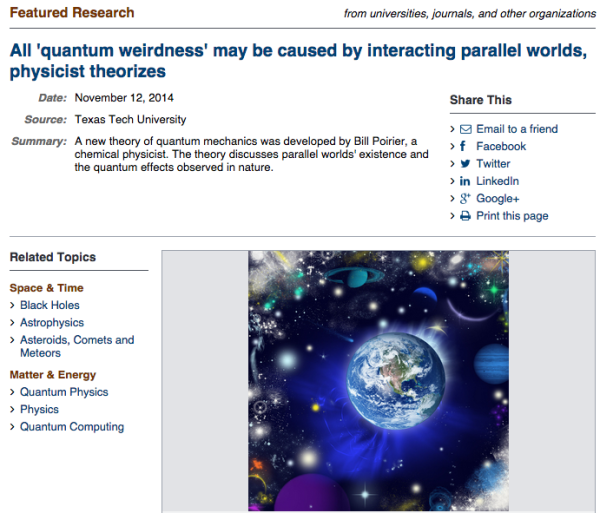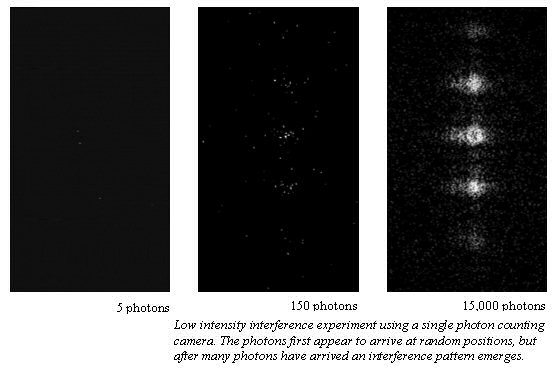“I asked the Zebra,
are you black with white stripes?
Or white with black stripes?
And the zebra asked me,
Are you good with bad habits?
Or are you bad with good habits?
Are you noisy with quiet times?
Or are you quiet with noisy times?
Are you happy with some sad days?
Or are you sad with some happy days?
Are you neat with some sloppy ways?
Or are you sloppy with some neat ways?
And on and on and on and on and on and on he went.
I’ll never ask a zebra about stripes…again.” -Shel Silverstein
What about, though, when it comes to the fundamental nature of things in the Universe? Are they waves that act like particles? Or are they particles that act like waves?
Is reality completely deterministic, or is it random? Is it local, or is it non-local? Is it a superposition of many different states, or is it a single, chosen path all-the-way-through? And is it based on the interaction of many Universes, an infinite number of Universes, or just our single, solitary one?
 Image credit: Science Daily via Texas Tech, at http://www.sciencedaily.com/releases/2014/11/141112131927.htm.
Image credit: Science Daily via Texas Tech, at http://www.sciencedaily.com/releases/2014/11/141112131927.htm.
Believe it or not, these may not even be be well-posed questions. Find out about the true (and sometimes uncomfortable) quantum reality of our Universe!


Do any of the interpretations lead one to think of tricks to make solving the math easier? Or you simply stuck with the math without any quidance from physical intuition?
I believe there is a objective reality,so many of the "interpretations" will be shown to be false in the future,if not now.
An other Zebra question !
energy-space
or
space-energy
You wrote « we still don’t know which interpretation is the right one. Because the answer is they all are, the same way there’s no one uniquely right way to solve an equation like 162 ÷ 9 ».
In a similar way, if I have 7 apples and someone gives me 2 others, I finally get 9. If you couldn’t tell what happened, you could say that all that counts is the mathematical result 9. You can get it from 13 - 4 as well as 3 x 3.
What you say is something very similar. It is a pragmatic position, nothing more, nothing very illuminating about the physical reality.
Love the blog Ethan, but I will have to disagree with you when it comes to the significance of interpreting a physical theory. Science isn't just about being able to test predictions and calculate outcomes, and if that's what you truly believe then its unfortunate. That conception of science (which goes under the philosophical heading of instrumentalism), is wrong headed because we should be trying to understand how the universe actually works. And that means we should do our best to understand the most fundamental dynamics of physical reality. I'm sorry, but there's one objective, mind-independent way that the universe operates, and the function of science is to get closer and closer to that truth over time. It's an imperfect and messy process, but it's the only one we have.
One thing I think you might want to consider editing is:
"There are some interpretations that are demonstrably wrong: the idea that physics is local (things can only affect things they interact with), real (as opposed to complex, or partially imaginary), and deterministic cannot all be simultaneously true."
That's an incorrect statement, as the Many-Worlds Interpretation (which seems to be gaining proponents in addition to the high profile physicists that have advocated it for decades) is 100% local, realist, and fully deterministic. In addition, while we're on the topic of randomness, I really don't get how some physicists say "Yea, I understand that completely non-causal random events come from nowhere and affect things in the world," when there are completely deterministic alternatives. Complete randomness doesn't exist, and it sounds too akin to magic for someone to seriously believe it. Can't really go about screwing with causality without some severe repercussions.
Love these types of posts and I hope to continue reading here for a long time to come, just wanted to add those points into the mix. If anyone has any thoughts I'd be happy to hear them.
I had always taken the course that what was interfering was the probabilities of the path taken, and this would be based on the organisation of the entire apparatus and therefore require no other explanation than the geometries and forces involved by the fact of their existence.
Interesting little fiddles then turn up:
1) Is this information propagated at thespeed of light or not?
2) What would you do to check (some sort of shutter on a two-slit experiment? some sort of modulation to change the system from looking for *which* slit a particle went through and looking to see if the interference pattern disappeared when the experiment changed faster than information ABOUT the change could get through the system?
3) What does that tell us about "reality"? For example, a thought is that quantum space is an extended "now". For a photon,all distances are less than the planck length, hence everywhere is all "now", and the many-paths approach of Feynman is a simple consequence of each path being able to interfere because they are all the same path in "space". So is that also why you have space indeterminacy with particles? We can't say "where" because to some extent, the space location is only mathematically distant from another location, whilst it, as far as the universe is concerned, precisely the same place.
All completely above my pay scale, but it keeps me interested in science.
@Wow #6: These are all good questions, and the answers to the first two are known experimentally. "A. Zeilinger" is the author you want to look up in arXiv or Google Scholar. Pick any of his papers, or even better, some of his review articles, and you can see what the state of the art is.
1) The entanglement is known to propagate _at_least_ 1.5e+4 times c (http://arxiv.org/pdf/quant-ph/0007008.pdf). Conventional QM assumes that it is infinite. This should not be called "information" because it cannot be used for signaling.
2) Look up "delayed choice" experiments. The stereotypical setup is a Mach-Zender interferometer with a Pockels cell in one arm.
3) It's much more complicated than that :-) What you say is not an unreasonable hypothesis for photons, but it breaks down for massive particles. Two-slit experiments have been done with electrons, neutrons, and even extremely large oganic molecules, above 10 kDa (http://arxiv.org/abs/1310.8343). At that point, the particles are most definitely _not_ following null geodesics :-)